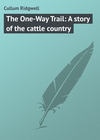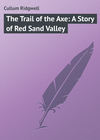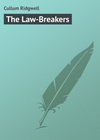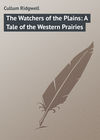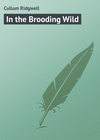Czytaj książkę: «The One-Way Trail: A story of the cattle country», strona 13
CHAPTER XX
APPROACHING THE TRIBUNAL
The sun was mounting royally in the eastern sky. There was not a breath of air to temper the rapidly heating atmosphere. The green grassland rolled away on every hand, a fascinating, limitless plain whose monotony drives men to deep-throated curses, and yet holds them to its bosom as surely as might a well-loved mistress. It was a morning when the heart of man should be stirred with the joy of life, when lungs expand with deep draughts of the earth’s purest air, when the full, rich blood circulates with strong, virile pulsations, and the power to do tingles in every nerve.
It was no day on which a man, branded with the worst crime known to a cattle country, should set out to face his fellow men. There should have been darkening clouds on every horizon. There should have been distant growlings of thunder, and every now and then the heavens should have been “rent in twain with appalling floods of cruel light,” to match the hopeless gloom of outraged innocence.
But the glorious summer day was there to mock, as is the way of things in a world where the struggles and disasters of humanity must be counted so infinitesimal.
This was the morning when Jim Thorpe turned his stiffly squared back upon the “AZ” ranch. He wanted no melodramatic accompaniment. He wanted the light, he wanted the cheering sun, he wanted that wealth of natural splendor, which the Western prairie can so amply afford, to lighten the burden which had so suddenly fallen upon him.
It was another of Fate’s little tricks that had been aimed at him, another side of that unfortunate destiny which seemed to be ever dogging him. Well might he have cried out, “How long? How long?” Whatever the fates had done for him in the past, whatever his disappointments, whatever his disasters, crime had found no place in the accusations against him. It almost seemed as though his destiny was working its heartless pranks upon him with ever-growing devilishness.
With subtle foresight, and knowledge of its victim it timed its efforts carefully, and directed them on a course that could hurt his spirit most. Even when his inclinations, his sensibilities were at their highest pitch, down came the bolt with unerring aim, and surely in the very direction which, at the moment, could drive him the hardest, could bow his head the lowest.
Four years in the cattle world had ingrained in him the instincts of a traffic which possesses a wholesome appeal to all that is most manly in men. Four years had taught him to abhor crime against that traffic in a way that was almost as fanatical as it was in such men as McLagan and those actually bred to it. He was no exception. He had caught the fever; and the cattleman’s fever is not easily shaken off. As McLagan would show no mercy to his own brother were he a proven cattle-thief, so Jim loathed the crime in little less degree. And he was about to face the world, his world, branded with that crime.
It was a terrible thought, a hideous thought, and, in spite of his squared shoulders, his stiffened back, his spirit, for the time, was crushed under the burden so unjustly thrust upon him. He thought of Peter Blunt, and wondered vaguely what he would say. He wondered what would be the look in the kindly gray eyes when he spoke the words of comfort and disbelief which he knew would await him. That was it. The look. It was the thought behind the words that mattered–and could so hurt.
As the miles swept away under his horse’s raking stride, he tried to puzzle out the riddle, or the “nut” he had set out to crack, as McLagan had been pleased to call it. He could see no explanation of it. Why his brand? He knew well enough that cattle rustlers preferred to use established brands of distant ranches when it was necessary to hold stolen cattle in hiding before deporting them from the district. But his brand. It was absurd from a rustler’s point of view. Everybody knew his small bunch of cattle. Any excessive number with his brand on would excite suspicion. It was surely, as he had said, the work of a prentice hand. No experienced thief would have done it.
He thought and thought, but he could see no gleam of light on the matter.
As the miles were covered he still floundered in a maze of speculation that seemed to lead him nowhither. But his efforts helped him unconsciously. It kept his mind from brooding on the disaster to himself, and, to a man of his sensibilities, this was healthy. He had all the grit to face his fellow men in self-defense, but, to his proud nature, it was difficult to stand up under the knowledge of a disgrace which was not his due.
He was within a few miles of Barnriff when his mind suddenly lurched into a fresh channel of thought. With that roving, groping after a clue to the crime of which he was morally accused, Eve suddenly grew into his focus. He thought with a shudder what it would have meant to her had she married him instead of Will. He tried to picture her brave face, while she writhed under the taunts of her sex, and the meaning glances of the men-folk. It was a terrible picture, and one that brought beads of perspiration to his brow.
It was a lucky–yes, in spite of Will’s defections–thing for her she had married the man she did. Besides, Will had mended his ways. He had kept to the judgment that Peter Blunt had passed on him. Well, he would have the laugh now.
Then there was Will’s success. Everything had gone his way. Fortune had showered her best on him, whether he deserved it or not. She apparently found no fault in him. And they said he was turning out thousands of dollars. But there, it was no use thinking and wondering. The luck had all gone Will’s way. It was hard–devilish hard.
Poor Eve! He caught himself pitying her. No, he had no right to pity her. The pity would have been had she married him. And yet–perhaps this would never have happened had she married him. No, he told himself, it would never, could never have happened then. For, in the fact of having won her, would not his luck have been the reverse of what it was?
Suddenly he wondered what she would think when he told her–or when others told her, as, doubtless by this time, they had already done. He shuddered. She was in a cattle country. She was ingrained with all its instincts. Would she condemn him without a hearing? When he went to speak to her, would she turn from him as from something unclean? Again the sweat broke out at his thought. She might. The facts were deadly against him. And yet–and yet somehow– No, he dared not speculate; he must wait.
There was the humble little village on ahead of him, nestling like some tiny boat amidst the vast rollers of the prairie ocean. There, ahead, were his judges, and amongst them the woman who was still more to him than his very life. He must face them, face them all. And when their verdict was pronounced, as he knew it would be in no uncertain manner, then, with girded loins, he must stand out, and, conscious of his innocence, fight the great battle. It was the world–his world–against him, he knew. What–what must be the result?
CHAPTER XXI
INSPIRATION
Half an hour later Jim rode into Barnriff. It was getting on toward noon, and most of the villagers were busy at their various occupations. As he rode on to the market-place he glanced quickly about him, and, all unconsciously, there was defiance and resentment in his dark eyes; the look of a man prepared for the accusations which he knew were awaiting him. But this attitude was quite wasted, for there were few people about, and those few were either too far off, or too busy to note his coming, or appreciate his feelings, as expressed in his dark eyes.
It is strange how instinct will so often take the lead in moments critical in the lives of human beings. Jim had no thought of whither his immediate destination lay, yet he was riding straight for the house of the friendly gold prospector. Doubtless his action was due to a subconscious realization of a friendliness and trust on the part of Peter, which was not to be overborne by the first breath of suspicion.
He was within fifty yards of that friendly, open door, when he became aware that a woman’s figure was standing before it. Her back was turned, and she looked to be either peering within the hut, or talking to some one inside it. Nor, strangely enough, did he recognize the trim outline of her figure until she abruptly turned away and moved off in the direction of her own house. It was Eve Henderson. And, without hesitation, he swung his horse in her direction.
She saw him at once and, smiling a welcome, waited for him to come up. He saw the smile and the unhesitating way she stepped forward to greet him. There could have been no doubt of her cordiality, even eagerness, yet with the shadow of his disgrace hanging over him, he tried to look beyond it for that something which he was ready to resent even in her.
He saw the shadow on her face, which even her smile had no power to lift out of its troubled lines. He saw dark shadows round her eyes, the tremulous, drooping mouth, once so buoyant and happy, and he selfishly took these signs to himself, and moodily felt that she was trying vainly to conceal her real thoughts of him behind a display of loyalty.
There was no verbal greeting between them, and he felt this to be a further ominous sign. Somehow, he could not force himself to an ordinary greeting under the circumstances. She had doubtless heard the story, so– But he was quite wrong. Eve was simply wondering at his coming. Wondering what it portended. She had truly enough heard the story of the recovery of the cattle, as who in Barnriff had not? But her wonder and nervousness were not for him, but for herself. It was for herself, and had to do with that fear she had told Annie Gay of, and which now had become a sort of waking nightmare to her.
Jim sprang from the saddle. Linking his arm through the reins, he stood facing the woman he loved. “Well?” he said, in a curious, half-defiant manner, while his glance swept over every detail of her pretty, troubled face. Finally it settled upon the slight scar over her temple, and a less selfish feeling took possession of him. The change in her expression suddenly told him its own story. Her eyes were the eyes of suffering, not of any condemnation of himself.
“I–I’ve just been over to see if Peter was in,” she said hesitatingly.
“Peter? Oh, yes–and, wasn’t he?”
Jim was suddenly seized with a feeling of awkwardness such as he had never before felt when talking to Eve.
The girl shook her head and began to move in the direction of her house. He fell in beside her, and, for a moment, neither spoke. Finally she went on.
“No,” she said regretfully. “And I sure wanted to see him so badly. You see,” she added hastily, “Elia is away. He’s been away for days, and, well, I want to know where he is. I get so anxious when he’s away. You see, he’s so–”
“And does Peter know where he is?”
“Yes. At least I’m hoping so. Elia goes with him a deal now, on his expeditions. Peter’s real good to him. I think he’s trying to help him in–in–you know Elia is so–so delicate.”
The girl’s evident reluctance to put into words her well-loved brother’s weaknesses roused all Jim’s sympathy.
“Yes, yes. And is he supposed to be with Peter now?”
“He went away with him four days ago.”
“I see.”
Then there was another awkward pause. Again Eve was the one to break it. They were nearing the gate of her little garden.
“But what has brought you into town, Jim?” she suddenly asked, as though his presence had only just occurred to her as being unusual.
With a rush the memory of all his disgrace came upon him again. He laughed bitterly, harshly.
“Another of Dame Fortune’s kicks,” he said.
“Another?”
“Yes–ah, I forgot. Of course. Well, we’ll call it one of Dame Fortune’s kicks.”
“You mean the–cattle stealing?” She was staring straight ahead of her, and into her eyes had leaped a sudden look of fear which she dared not let him see.
But Jim was too busy with himself to even notice her hesitation. He had no room to realize her emotions just then.
“Yes,” he said, almost viciously. “It’s about that–I s’pose I ought to say ‘because’ of that.” She glanced at him swiftly, but waited for him to go on. He did so with another nervous laugh. “I’m ‘fired,’ Eve. Kicked out by Dan McLagan, and branded by him as a suspected cattle-thief, as surely–as surely as they’ve found a bunch of his cattle branded with my brand.”
They had reached the gate, and Eve turned facing him. There was a curious look in her eyes. It was almost one of relief. Yet it was not quite. There was something else in it. There was incredulity, resentment; something which suggested a whole world of trust and confidence in the man before her.
“Nonsense,” she cried. “You–you accused of cattle stealing? You? He must be mad. They must all be mad.”
“They?”
The girl suddenly flushed. She had said more than she intended. But there was no use drawing back.
“Oh, yes,” she cried hotly. “I didn’t mean to let you know. I’ve heard the story. Of course I have. Who, living in such a place as Barnriff, wouldn’t hear it?” she hurried on bitterly. “Directly they told me I laughed at them. But–but they do suspect you. Oh, Jim, I think I hate these folks. You–you suspected of cattle-duffing. McLagan ought to be ashamed of himself. It’s cruel in such a country as this. And the evidence is so ridiculous. Oh, Jim, if it weren’t so horrible it would be almost–almost laughable.”
“Thanks, Eve. And that–is really what you feel?”
She looked him in the face with wide, wondering eyes.
“Why, of course it is.”
The man smiled ever so slightly. He felt better. A few more loyal friends like this and his position would be considerably easier.
“But they are all branded with my ‘**’s,” he went on doubtfully.
“And what of it? It’s a blind. It’s to put folks off the real track. I–” She broke off, and her eyelids were suddenly lowered to hide the fear with which her own words again inspired her. As she did not continue Jim seized his opportunity to pour out something of what he felt at her unquestioning loyalty.
“Eve,” he cried, his eyes lighting with the love he was powerless to keep altogether under. “You don’t know what all your words mean to me. You don’t know how glad they make me feel. Do you know, when I was riding up to you just now I was looking for a sign of suspicion in your eyes? If I’d seen it–if I’d seen it, I can’t tell you what it would have meant to me. I almost thought I did see it, but now I know I was wrong. There’s just about two folks for whose opinion I care in this village, you and Peter. Well, now I feel I can face the rest. For the present I’m an unconvicted cattle rustler to them. There’s not much difference between that and a rawhide rope with them. But there’s just a bit of difference, and to that bit I’m going to hold good and tight.”
Eve’s face suddenly went an ashy gray.
“But, Jim, they’d never–never hang you.” Her voice was low. There was a thrill of horror in it which made the man’s heart glow. He felt that her horror was for his safety, and not for the fact of the hanging. Then the feeling swiftly passed. He remembered in time that she was the wife of another.
“They would,” he said decidedly. “They’d hang me, or anybody else, with very little more proof than they’ve already got. You don’t realize what cattle-duffing means to these folks. It’s worse than murder. But,” he went on, struggling to lighten his manner, “they’re not going to hang me, if I know it. It’s up to me to run this rustler to earth. I’m going to. That’s what I’m out for. After I’d made up my mind to hunt the devil down McLagan informed me, not in so many words, of course, that to do so was the only way to convince folks of my innocence–himself included. So I’m going to hunt him down, if it takes months, and costs me my last cent. And when I find him”–his eyes lit with a terrible purpose–“may God have mercy on his soul, for I won’t.”
But the girl had no response for him. Her enthusiastic belief in his innocence found no further expression. When he pronounced his determination her eyes were wide and staring, and as he ceased speaking she turned them toward the distant hills, lest he should witness the terror she could no longer hide. A shudder passed over her slight figure. She was struggling with herself, with that haunting fear that was ever dogging her. The thought of the rawhide rope had set it shuddering through her nerve centres afresh in a way that bathed her in a cold perspiration.
For a moment she stood battling thus. Then, in the midst of the struggle something came upon her, and her heart seemed to stand still. It was as though a flash of mental light had illumined her clouded horizon. Realization swept in upon her, a full terrible realization of the source of her fear.
It was to do with this cattle stealing. Yes, she knew it now. She knew more. She knew who the cattle-rustler was, for whom Jim was to stand the blame. She needed no words to tell her. She had no evidence. She needed none. Her woman’s instinct served her, as though she had witnessed his acts. It was Will. It was–her husband.
And, all unconsciously, for so long this had been her fear. She remembered now so many things. She remembered his cynical laugh when he told her of his gold find, and how easy it was to work. She remembered her lack of confidence in his story–knowing the man as she did. She remembered her repugnance at the sight of the money he had spent on her, and how she could never bring herself to touch that which he sent to her. She had believed then that her reasons were personal. That it was because it came from him, the man who had struck her down, and left her to die at his hands, for all he cared; the man whose brutality had so quickly killed her love; the man whom she had long since admitted to herself that she detested, despised. No, she needed no further evidence. It was her woman’s instinct that guided and convinced her.
She shuddered. She was chilled under a blazing sun that had no power to warm her. But her terror was not for Will. It was for herself. For the hideousness of the disgrace to which he had brought her. In fancy she saw him food for carrion at the end of a rope; she saw his body swaying to the night breeze, an ominous, hideous shadow, a warning to all of the fate awaiting those who sinned against the unwritten laws of the cattle world. She heard the pitying tones of the village women, she saw their furtive side glances, heard their whispering comments as they passed her, these women whom she had always lived amongst, whom she had always counted as friends. Oh, the horror of it all, and she was utterly–utterly powerless. Worse, she must strive her utmost to shield Will. And, because he was her husband, she must leave Jim to fight his own battle with her added wits pitted against him.
She remembered Jim’s words. “May God have mercy on his soul, for I won’t.” Jim–Jim was to be Will’s Nemesis–her Nemesis. He must be the man who would drive the sword crashing her to the dust beneath the weight of her husband’s crime.
A despairing hope swept her. Ah, no, no. It could not be. That would be too cruel. No, no, she must be wrong. Will was not guilty. He could not be. This thing could surely never come upon her. What had she ever done to deserve it? What–? She thought of the man before her. What had he ever done to deserve his fate? And suddenly the momentary hope slid from under her feet.
Now her thought and terror found expression against her will. It would not be denied. It showed in her shrinking attitude. It was displayed in her horrified eyes. And Jim saw these things and read them in his own way. He deemed that he had shocked her by his words, nor could he clearly understand that the force of his determination to defend himself should so shock her. However, he promptly strove to lighten the impression he had made.
“Don’t let us speak of these things. Let us think and speak of other matters. You see,” he went on whimsically, “you were the first person I met, and I s’pose it was only natural you should get all the burden of–of my nightmare.”
But Eve could not rid herself of her terror. She felt she must talk of this thing.
“No,” she said with an effort to keep calm, “we must talk of it. We must think–think–”
“There is no need for you to think, Eve. Put it out of your head. I shall run him to earth–”
“But, Jim,” she broke out, his words driving her to fresh terror, “it must be some half-breeds. Or–or–some ‘toughs’ from across the border. It must be. We are very near the Canadian border, remember. They’re always being driven across by the Mounted Police.”
“No, it’s some one in the locality. Some one nobody would suspect. You see, there have been no strangers in the district for months.”
“How do you know?” Eve’s startled inquiry came almost defiantly.
If the man noticed her tone he gave no sign. He shook his head decidedly.
“We’ve had the district hunted, scoured thoroughly, sure.” Then he shrugged. “But it don’t matter. Psha! I’d sooner it was some half-breed or tough. I’d–I’d be less sorry for him.” He paused and gazed tenderly into her troubled face. “But you don’t need to be so shocked. Why?” he inquired. “This thing can’t hurt you.”
The girl jumped at the chance of denial.
“No, no, of course not,” she exclaimed eagerly. Then, with a pitiful effort at subterfuge, “But you, Jim. To think that you are blamed.”
In an instant his love was uppermost again. Her distress, whatever its cause, appealed to all that was best and manliest in him. Just now he took it to himself. And, in consequence, he found it hard to keep himself within the bounds of restraint. She was so sweet, so desirable in the pathetic picture she made.
“Never you worry, Eve,” he said, with infinite gentleness. “This is up to me, and–I’m going to see it through. But here, I’m so full of my own troubles I’m forgetting all the good things coming your way. Say, I’m mighty glad of your luck. Will’s claim is a bonanza, I’m told. I hear wonderful accounts of it–and of him.” Then his voice lowered and his calm eyes darkened. “He has straightened up, hasn’t he? It’s a great thing. You’ll be happier–now. You–you won’t need my help–I mean for him. They tell me he’s hit the right trail, and is busy traveling it.” He sighed. “I’m glad, real glad–for you.”
But curiously enough his sympathy met with no response. On the contrary, Eve seemed to freeze up. Every word he uttered lashed her until she felt she must blurt out to him the thing she believed to be the truth. But even in her agony of heart and mind she remembered what she conceived to be her duty, and, in self-defense, assumed a cold unresponsiveness.
“They say he’ll be a way up millionaire,” Jim went on, so busy with his own thoughts that he did not notice her silence. “Gee, and so easy, too. It’s queer how fortune runs. Some folks work like–like Dagos, and get–mud. Others have gold poured over ’em, whether they work or not. But he must have worked to find it. Yes, sure. And having found it you can’t blame him for not letting folks into the secret–eh?”
But Eve had not spoken. It was only a look, and an inarticulate sound. But it was a look of such abject terror that it could no longer escape the man’s thoughtful eyes. Eve had betrayed herself in her very dread lest he should suspect. His reference to Will’s secret had suggested suspicion to her, and the rest was the result of her innate honesty and simplicity.
Jim stared at her. And slowly a curious look crept into his eyes. Her terror was so evident, and–he thought back over the words that had inspired it. He was talking of Will–of Will’s secret. For the moment he stood dumbfounded at that which flashed through his mind. Then he turned slowly, and mechanically threw the reins over his horse’s neck.
When he looked round again Eve was still staring at him. Her terror was, if possible, intensified. Suddenly a great pity for her rose up in his heart. All his love was stirred to the almost limitless depths of his big heart. How he loved this woman! How he longed to take her to his heart, and shelter her from all the cruel buffeting of a harsh life! How he would fight for her, strive for her, work for her–and now? He thought of the brand that had fallen upon him, and he thought of that something which her sudden terrified glance had stirred in his unsuspicious mind.
“Guess I’ll get on to the saloon, as Peter isn’t in his hut,” he said, in a quiet, unmeaning tone. “I’ll see if I can locate Elia for you.” He paused, and then swung into the saddle. Glancing down at her, he leaned forward and spoke earnestly. “Eve,” he said, “it still stands good: the old order. When you need me–for anything, mind–you’ve only got to send me word. Wherever I am I’ll come.” He straightened up. He saw the girl make an effort to swallow, and glanced away to give her a chance to recover her composure. As he did so he saw a number of women and some men scattered about at the doorways of various houses. He promptly turned to the girl.
“Gee!” he cried, with a slightly forced laugh. “The vultures are around. They’re looking for scandal, and, by the signs, I’d say they guess they’ve found it. To a man–or woman–they’re staring this way. Say, I’ll get going. Good-bye–and don’t forget.”
He rode off. Eve had not spoken. She knew that he knew, and she was overwhelmed at the knowledge. She slowly turned to the house, and with weary steps passed up the narrow pathway.
And Jim? The moment his face was turned from her his smile died out, leaving it stern and hard.
